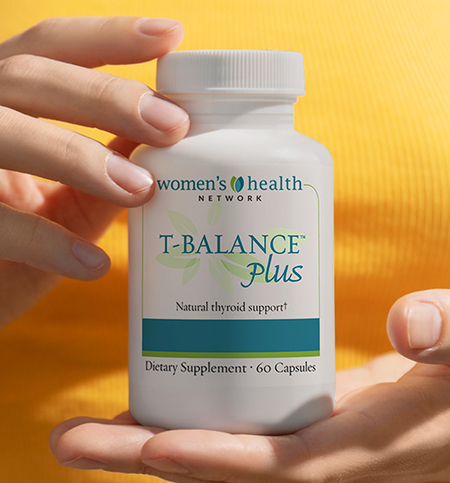By Dr. Mary James, ND
Fatigue, weight gain, hair loss, skin changes — do any of these symptoms sound familiar? Maybe something feels “off” in your body, yet your healthcare practitioner said that your thyroid levels are fine and everything is functioning normally. How can both things be true?
7 common symptoms of low thyroid function
- Severe fatigue, loss of energy
- Weight gain, difficulty losing weight
- Dry skin
- Hair loss
- More sensitivity to cold
- Diminished sex drive
- Puffiness in face and extremities
What is subclinical hypothyroidism?
- Subclinical hypothyroidism refers to abnormally low thyroid function. When TSH (thyroid-stimulating hormone) is slightly high or almost high, but blood levels of thyroid hormones are normal.
- Up to 8% of the general population has subclinical hypothyroidism. Women have it more often than men, and it becomes more common as we age. When thyroid hormone production drops, TSH typically increases as the pituitary gland, which makes TSH, signals the thyroid to make more hormone.
- Conventional doctors often don’t address the issue at all. Even if your TSH is in the “normal” range (which is wide) on standard thyroid tests, your symptoms can still feel unbearable.
In functional medicine, we focus on addressing imbalances before they tip the scale toward disease. Even slightly elevated TSH levels are seen as an indication that your thyroid hormonal balance is off and it is appropriate and important to correct the imbalance as soon as possible.
The misleading results of conventional thyroid tests
Most labs consider TSH above 4.5 or 5 mIU/L as abnormal and indicative of hypothyroidism. Because the normal TSH cutoff used to be around 10, many conventional doctors still don’t consider a TSH between 5 and 10 to be significant and they may not treat it.
But I’ve found good evidence for paying attention to TSH levels above 2.5. Thyroid lab reference ranges were established by averaging numbers from many people. I think it’s interesting that when data from those participants with anti-thyroid antibodies are excluded from that calculation, the cutoff for “normal” TSH drops to 2.5 — a good argument for paying attention to TSH numbers above this level!
In general, doctors are more likely to consider prescribing thyroid medication if you have thyroid symptoms and abnormal lab results, especially if anti-thyroid antibodies are found. But, even if just one of these three factors is an issue for you (symptoms, TSH levels above 2.5 or elevated anti-thyroid antibodies), it may be time to support your thyroid with natural measures.
Causes of subclinical hypothyroidism and thyroid imbalance
All of your endocrine glands produce hormones and are extremely sensitive and deeply interconnected. Because of these feedback loops between glands like the thyroid, adrenals (our stress-responders) and ovaries, imbalances in one area can easily trigger imbalances in another.
Here’s an example: because the adrenal hormone cortisol is needed to make T3, our most active thyroid hormone, a cortisol deficiency can cause hypothyroidism. But so can too MUCH cortisol from acute stress — it’s a delicate balancing act for the body. That’s why supporting your adrenals is one of the best ways to also support your thyroid.
Another common cause of thyroid imbalances is thyroid autoimmunity, where your body’s immune system gets confused and makes antibodies against your own thyroid. Get your blood checked for anti-thyroid antibodies if:
1. You already know that your thyroid function is low
2. You have symptoms suggesting low thyroid
3. You have a family history of hypothyroidism
4. You have an autoimmune disorder
Note that this is not a standard test, so you will probably have to ask your doctor to include it in your thyroid panel.
Elevated thyroid antibodies indicate you have an autoimmune thyroid condition — the most common cause of low thyroid function in the western world. Sadly, this often progresses to overt thyroid disease if not addressed early on. In most cases, you can slow or even prevent this progression by addressing any inflammatory disorders, infections or allergies you might have. It’s also important to maintain healthy gastrointestinal function and eat nutritiously.
Other factors that can interfere with thyroid hormone production include too much estrogen, birth control pills, some medications, chronic illness and environmental toxicity.
5 steps to support your thyroid naturally
Whether you’re taking thyroid medication or not, supporting your thyroid health can only help. Sometimes, natural thyroid support may enable you to reduce or even stop taking medication with your practitioner’s advice. In general, if you’re taking thyroid medication AND you’re working to improve your health, have your TSH and other thyroid markers monitored, since you may need to have your medication reduced at some point.
When you support your adrenals you also help your thyroid. The following steps do both:
1. Take in the right nutrients. The most important fuels for thyroid health are vitamins B2, B3, B6, C, E, A and D, as well as zinc, copper, selenium, tyrosine and iodine. These nutrients work best as part of a well-balanced diet. And adding fish oil with EPA and DHA helps with all thyroid imbalances. (We offer a high-quality omega-3 fish oil supplement in our SHOP). Fish oil, selenium and Vitamin D are especially helpful in autoimmune thyroiditis. So is eliminating gluten from your diet and adding the herb rosemary to your food.
2. Explore thyroid-supportive herbs. Ashwagandha is a great herb for your hormonal system. It sensitizes thyroid receptors to thyroid hormone and also supports the adrenals. You might also try Bacopa monnieri, Coleus forskohlii, hops and sage plus iodine and selenium for total thyroid support.

3. Get enough sleep to feel rested. Setting a regular bedtime and getting 7-8 hours of sleep per night can do wonders for your thyroid health and stress levels.
4. Find exercise you enjoy. Regular exercise is a great way to relieve stress and support your thyroid. Choose something you enjoy, rather than anything that feels like a chore. Yoga, dance and walking in nature are some of Women’s Health Network’s customer favorites.
5. Eat a Mediterranean-style diet. This includes plenty of fresh, organic vegetables and fruits, adequate protein (especially cold-water fish, and meat or poultry that is free of hormones and antibiotics), healthy oils like olive oil, and whole grains and legumes. Some people suggest avoiding soy though many studies suggest that soy is not a problem, especially when it’s cooked or in fermented form, like tempeh or miso. Avoid processed foods, trans fats and reduce your intake of white-flour products. It’s also important to avoid sugar and too much caffeine, as both of these can be hard on your adrenals and affect your hormonal balance.
As too many women know, overall health suffers when thyroid function is low. It’s also true that thyroid function suffers when overall health is compromised. That’s why a healthy lifestyle and balanced diet are so important to thyroid health.
Don’t forget, we are here for support whenever you need it. I wish you thyroid health and plenty of happiness!












